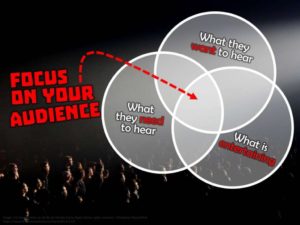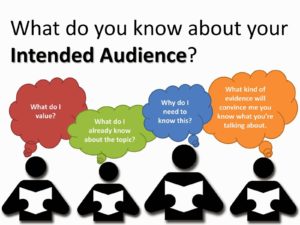Focus On Your Audience
Focus On Your Audience
 You need to focus on your audience as you preach; that’s the lesson of today’s post. However, if you are going to do this well, you need to know who your audience is. To whom do you preach? In a previous post on this blog I made the point that we should focus on the whole audience, and that we should have illustrations that bring everyone into your point.
You need to focus on your audience as you preach; that’s the lesson of today’s post. However, if you are going to do this well, you need to know who your audience is. To whom do you preach? In a previous post on this blog I made the point that we should focus on the whole audience, and that we should have illustrations that bring everyone into your point.
However, in this post (and the last two), we are learning what we can from television with its great success in communication. And one of the things that television does really well, as I said in the last post, is to focus on a particular audience. Or, as it is put in language of television, “Who are you targeting?” This is important for your preaching, as we will see in this series of posts. You will be more effective, so a television executive would say, if you have a laser focus on a particular audience.
An Example
To give you an idea of what I’m talking about, here is a quote from Andy Stanley, reflecting on how he targets the services and his sermons.

Andy Stanley
“And in terms of the audience who I’m speaking to, it’s the 35-year-old guy who’s married and has some young kids and is in a business; that’s the guy. Because if I can talk to the guy, whether it’s the principle of the message or the application of the message, I’m going to get the whole family. The reason I’m targeting the guy is because the person that’s most resistant to getting up on Sunday morning is that 35 to 40-year-old guy.
He’s got a measure of success; he’s got options on Sunday. He’s not against God. He’s not even against Jesus, but we’re taking a block of his time. And his time is precious because he works hard. He may be out of town a lot, and now he’s thinking, “You want me to get up and get dressed and go somewhere? It better be good.”…So, I feel like if I can talk to that guy, he’ll get his wife there…. And the women in turn will get their children there….”” (quoted in Stop Preaching and Start Communicating, p. 53-54)
Obviously, he has learned to focus on his audience. It’s okay if others come, if others listen in. But his focus is on the people in his community that he feels he can reach effectively.
The Implications of a focus on your audience
So, if you learn to focus on your audience that will require that you learn everything about them. What do they like, and what do they not like? Why would they consider coming to church? And what is it that has kept them from church?
 Rick Warren did a great deal of research when he prepared to start Saddleback Church. He went door-to-door and asked people why they didn’t go to church. He was surprised to learn that the number one reason was because the sermons were boring and irrelevant. As a result of hearing this, he looked at his ten years of sermons that he had in his file. He read each message, and asked one question for each: “Would this message make sense to the unchurched people I just talked to?” He ended up throwing out all the sermons except for 3 of them. (Rick Warren, “How to Communicate to Change Lives–Part I,” Preaching Today Cassette no. 120)
Rick Warren did a great deal of research when he prepared to start Saddleback Church. He went door-to-door and asked people why they didn’t go to church. He was surprised to learn that the number one reason was because the sermons were boring and irrelevant. As a result of hearing this, he looked at his ten years of sermons that he had in his file. He read each message, and asked one question for each: “Would this message make sense to the unchurched people I just talked to?” He ended up throwing out all the sermons except for 3 of them. (Rick Warren, “How to Communicate to Change Lives–Part I,” Preaching Today Cassette no. 120)
He proceeded to develop a profile of the people he and his church would target. Saddleback Sam is college-educated, married, and has two kids. He’s in his late 30’s to early 40’s. He’s a professional, a manager, or an entrepreneur. And he’s married to Saddleback Samantha.
Over the years this profile has been further and more deeply developed.
Stay Tuned
So, figure out who your primary target is, and then focus on them in your preaching and ministry style. We’re going to continue to consider this subject in the next post. So stay tuned!




Leave a Reply
Want to join the discussion?Feel free to contribute!